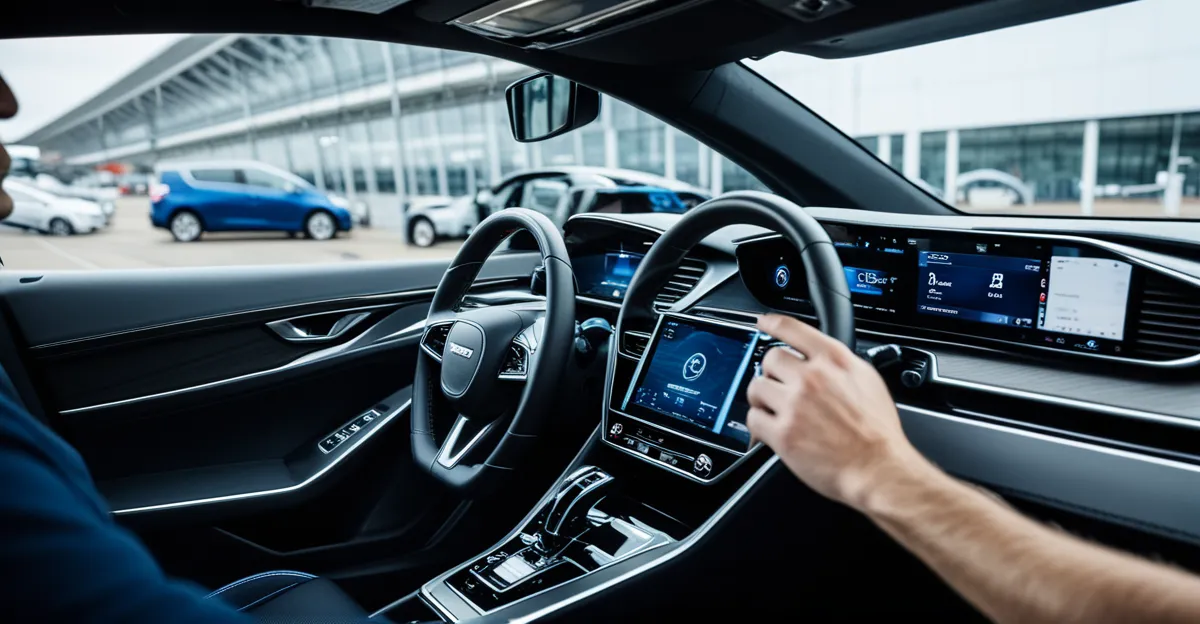Impact of Emerging Technologies on Passenger Comfort and Customisation
Emerging technologies are significantly elevating passenger comfort and advancing automotive personalisation within the UK automotive technology landscape. At the forefront, the integration of AI and the Internet of Things (IoT) enables vehicles to deliver highly personalised environments. For example, AI-powered climate control systems automatically adjust temperature and airflow based on individual passenger preferences, ensuring consistent comfort during trips.
Beyond temperature regulation, adaptive seating is revolutionising in-car comfort. Smart materials, such as memory foam embedded with sensors and temperature-regulating fabrics, conform dynamically to the occupant’s posture and thermal needs. These adaptive interiors can remember passenger seating positions and adjust in real time, enhancing comfort for all journeys.
This might interest you : How Can the UK Automotive Industry Lead a Sustainable Future?
Infotainment systems now go far beyond simple entertainment. Leveraging UK automotive technology advancements, these systems adapt content and user interfaces based on passenger profiles. This level of customisation provides passengers with a tailored multimedia experience, including personalised streaming and connectivity options, fostering a more engaging and comfortable travel environment.
British automakers offer insightful examples of these innovations. Several UK manufacturers are pioneering vehicles equipped with sophisticated customisable passenger features that marry AI, IoT, and smart materials. These automakers focus on creating cabins that feel bespoke, enhancing comfort and convenience whether in short urban commutes or long-distance drives. Their adoption of cutting-edge technology reflects a commitment to passenger-centric design, positioning the UK as a key player in automotive personalisation trends.
Also read : Is the Future of UK Automotive Industry Driven by Electric Cars?
In summary, the impact of emerging technologies on passenger comfort and customisation is profound. Through advanced AI, IoT integration, and smart materials, UK automotive technology is setting new standards for personalised, comfortable travel experiences.
Enhancing Safety and Security with Advanced Systems
Small text: Exploring technological safeguards that bolster in-car safety and comply with standards.
Modern automotive safety benefits immensely from the integration of AI and sensor technology. These systems enhance passenger protection by actively monitoring driving conditions and vehicle status to prevent accidents. Specifically, AI-driven features such as automatic emergency braking, lane-keeping assistance, and adaptive cruise control analyse real-time data from multiple sensors to identify and respond to hazards swiftly, reducing collision risks and improving occupant safety.
In terms of in-car security, connectivity plays a critical role. Vehicles equipped with IoT technologies enable constant communication with external networks and emergency services. This connectivity supports immediate safety alerts during critical events, such as airbag deployment or crash detection, facilitating faster emergency response times. Additionally, systems can provide real-time updates about vehicle status and location, enhancing security against theft and unauthorized access.
The UK’s stringent vehicle safety regulations drive the widespread adoption of these advanced systems. Manufacturers align their innovations with standards set by UK regulatory bodies, ensuring compliance while advancing passenger safety technology. The adherence to these rules promotes best practices like rigorous crash testing, cybersecurity protocols, and data privacy safeguards within automotive software. Consequently, UK automotive safety integrates cutting-edge technology with robust legal frameworks, forging a trustworthy environment for vehicle occupants.
Connectivity and Seamless In-Car Experiences
Small text: Examining how IoT and digital infrastructure enhance passenger engagement and convenience.
In-car connectivity is a cornerstone of modern driving, reshaping how passengers interact with their vehicles and external services. Leveraging IoT platforms, connected vehicles provide continuous, reliable access to smartphones, streaming services, and real-time information. This constant linkage elevates passenger comfort by allowing seamless transitions between personal digital environments and the vehicle’s systems without interruption.
Integration of voice assistants and intelligent navigation exemplifies advanced UK automotive technology in action. Voice control enables hands-free operation for entertainment, communication, and navigation, enhancing safety and convenience simultaneously. Intelligent navigation systems access live traffic data and suggest optimal routes, improving journey efficiency while reducing passenger stress.
Moreover, ongoing UK initiatives to develop robust automotive digital infrastructure underscore the nation’s commitment to connected vehicle innovation. These efforts focus on enhancing network coverage, security, and interoperability between vehicles and external data sources. As a result, the connected car ecosystem in the UK is becoming more reliable and expansive, promising richer, more personalised in-car experiences for passengers across the board. This seamless in-car connectivity ultimately elevates comfort levels by integrating technology that adapts fluidly to passenger needs and preferences.
Autonomous and Electric Vehicles Redefining Passenger Experience
Small text: Exploring how autonomy and electrification transform mobility and in-car comfort.
Emerging UK autonomous vehicles are reshaping the passenger experience by shifting traditional roles within the car. Autonomous systems employ advanced AI-driven sensors and decision-making algorithms to handle driving tasks, allowing passengers greater freedom to engage in activities rather than focusing on navigation or control. This transition enhances passenger comfort by reducing fatigue and stress, fostering a more relaxed and personalised travel environment.
Electric vehicle innovation contributes further to improving cabin comfort and ambiance. Without internal combustion engines, EVs offer notably quieter rides, diminishing road and engine noise that often disrupts passenger relaxation. Additionally, the removal of bulky engine components permits more flexible interior layouts, enabling automotive personalisation through adjustable seating configurations and innovative storage solutions tailored to occupant needs.
The UK government actively supports both autonomous and electric vehicle advancements through funding, regulatory frameworks, and infrastructure projects. This backing accelerates industry innovation and adoption rates, positioning the UK as a leader in sustainable mobility solutions. As a result, passengers benefit not only from the technology’s convenience but also from its environmental advantages.
Together, autonomous functionalities and electric vehicle design redefine comfort, convenience, and customization, showcasing the transformative potential of emerging UK automotive technology in crafting future-ready travel experiences.
Trends, Data, and Future Prospects in UK Passenger Experience
Small text: Analysing current market insights and forecasting the future of mobility.
Understanding automotive technology trends in the UK is vital for grasping how passenger experiences will evolve. Research indicates a steady increase in consumer adoption of personalized features, particularly those enhancing passenger comfort and automotive personalisation. This growth aligns with a rising preference for vehicles equipped with smart climate control, adaptive seating, and connected infotainment systems, demonstrating clear demand for bespoke travel environments.
What does market analysis reveal about UK mobility’s future? Data shows that electrification and autonomy will profoundly shape upcoming models, with projections indicating a significant rise in UK autonomous vehicles and electric vehicle sales by 2030. This shift suggests passengers will increasingly benefit from quieter, safer rides with greater customization options. Additionally, integration of AI and IoT will expand, further personalizing interiors and improving connected experiences.
Expert opinions consistently emphasize the importance of regulatory frameworks that balance innovation with safety and privacy. UK regulations are expected to evolve alongside technological advances, fostering secure data management and facilitating wider adoption of new mobility solutions. The regulatory outlook also supports investments in digital infrastructure, which underpins seamless vehicle connectivity and enriched passenger engagement.
In summary, the future of UK passenger experience is poised for transformation through advancing technologies. Market data and expert insights confirm a trajectory toward more intuitive, adaptive, and sustainable vehicles—highlighting a future where automotive technology profoundly enhances how passengers experience mobility.




